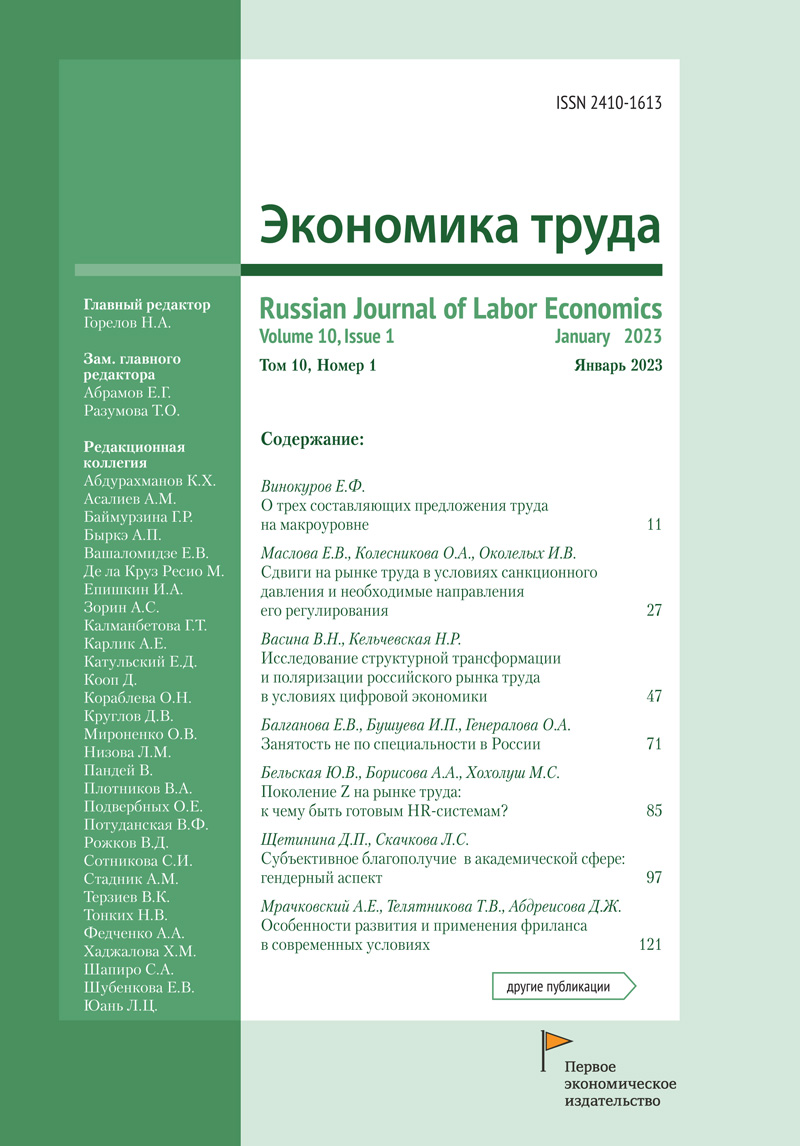Сдвиги на рынке труда в условиях санкционного давления и необходимые направления его регулирования
- Авторы: Маслова Е.В.1, Колесникова О.А.2, Околелых И.В.3
-
Учреждения:
- Воронежский государственный университетВоронежский институт экономики и социального управленияИнститут социального образования
- Воронежский государственный университетВоронежский институт высоких технологий
- Воронежский институт высоких технологий
- Выпуск: Том 10, № 1 (2023)
- Страницы: 27-46
- Раздел: Статьи
- URL: https://journals.eco-vector.com/2410-1613/article/view/607756
- DOI: https://doi.org/10.18334/et.10.1.116949
- ID: 607756
Цитировать
Полный текст
Аннотация
В статье предпринята попытка систематизации основных факторов, определяющих беспрецедентные сдвиги, происходящие во всех сферах жизни мира и особенно России, представлен научный анализ и обобщение их воздействия на структуру и динамику рынка труда, а также определены основные направления его регулирования. Авторы обосновывают вывод о том, что современная ситуация на рынке труда России определяется в основном взаимодействием факторов научно-технической цифровой революции, сокращения трудовых ресурсов, последствий пандемии COVID-19, санкций стран Запада и дополнительной мобилизации населения в связи со специальной военной операцией на Украине. Аргументировано, что рынок труда страны информационно не контролируется в полной мере, а проводимая цифровая реформа занятости не решает задачу совершенствования его информационного обеспечения. Преобладающим долгосрочным трендом на рынке труда является снижение спроса на рабочую силу при неустойчивой динамике ее предложения; структурные изменения в наибольшей степени распространяются на ключевые сферы экономики и профессиональные области высокой квалификации. В статье обоснованы задачи и направления: теоретической и научно-практической разработки проблематики переходного рынка труда нового типа – для новых территорий; совершенствования информационной базы полного рынка труда; доработки научно-методического обеспечения цифровой реформы занятости
Ключевые слова
Об авторах
Елена Валерьевна Маслова
Воронежский государственный университетВоронежский институт экономики и социального управленияИнститут социального образования
Email: evmas@yandex.ru
Профессор, доктор экономических наук
Ольга Андреевна Колесникова
Воронежский государственный университетВоронежский институт высоких технологий
Email: oakolesnikova@mail.ru
Профессор, доктор экономических наук, профессор
Ирина Викторовна Околелых
Воронежский институт высоких технологий
Email: irokol@yandex.ru
Эксперт, кандидат экономических наук, доцент
Список литературы
- 1. Чумаков А. Н. Культурно-цивилизационные разломы глобального мира // Век глобализации. – 2015. – № 2. – c. 35–47.
- 2. Григорьев Л., Кудрин А., Макаров И. Мировая экономика в период больших потрясений. - М.: ИНФРА-М, 2022. – 576 c.
- 3. Попов В.В. Опасный кризис западной цивилизации. [Электронный ресурс]. URL: https://goo.su/SnAo (дата обращения: 02.12.2022).
- 4. Назаретян А.П. Нелинейное будущее. Мегаистория, синергетика, культурная антропология и психология в глобальном прогнозировании. - М.: Аргамак-Медиа, 2017. – 510 c.
- 5. Huntington S.P. The Clash of Civilizations and the Remaking of World Order. Samuel P. Huntington. [Электронный ресурс]. URL: https://gtmarket.ru/library/basis/3893/3905 (дата обращения: 07.12.2022).
- 6. Маслова Е.В., Колесникова О.А., Околелых И.В. Проблемы трудовых ресурсов: дефицит, сдвиги в структуре, парадоксы старения // Социально-трудовые исследования. – 2022. – № 2 (47). – c. 42-55.
- 7. Маслова Е.В., Колесникова О.А., Околелых И.В. Современные трансформации рынка труда России: вызовы и необходимые реакции управления // Экономика труда. – 2022. – № 4. – c. 743-764.
- 8. Соловьева О. Спецоперация и мобилизация усиливают кадровый голод. Соловьева. [Электронный ресурс]. URL: https://goo.su/0JuPst7 (дата обращения: 08.12.2022).
- 9. Моляренко О.А. Формирование государственной статистики: взгляд «снизу» // Эко. – 2019. – № 10. – c. 8-34.
- 10. Стратегия развития Росстата и системы государственной статистики Российской Федерации до 2024 года. [Электронный ресурс]. URL: https://goo.su/4a4UhuR (дата обращения: 10.11.2022).
- 11. Федеральный закон от 28.06.2021 № 219-ФЗ «О внесении изменений в Закон Российской Федерации «О занятости населения в Российской Федерации» и статью 21 Федерального закона «О социальной защите инвалидов в Российской Федерации». [Электронный ресурс]. URL: https://www.consultant.ru/document/cons_doc_LAW_388474/ (дата обращения: 04.11.2022).
- 12. Работа России. Общероссийская база вакансий и резюме. [Электронный ресурс]. URL: https://trudvsem.ru (дата обращения: 10.11.2022).
- 13. Лищук Е.Н., Капелюк С.Д. Легко ли стать безработным? // Экономика труда. – 2022. – № 8. – c. 1263-1280.
- 14. Дрейзис Ю.И. Влияние современных информационных технологий на динамику занятости населения в России // Вестник Академии знаний. – 2018. – № 1(24). – c. 65-74.
- 15. Новикова И.В. Оценка информационного потенциала занятости населения в России // Информационное общество. – 2017. – № 4–5. – c. 28–34.
- 16. Avila Z. Public Employment Services pressing ahead with digitalization should beware of the digital divide. International Labour Organization. [Электронный ресурс]. URL: https://goo.su/tyxtg (дата обращения: 05.08.2022).
- 17. Социально-экономическое положение России, январь-сентябрь 2022 года. Федеральная служба государственной статистики. [Электронный ресурс]. URL: https://rosstat.gov.ru/storage/mediabank/osn-09-2022.pdf (дата обращения: 21.09.2022).
- 18. Былков В.Г. Социально-экономические предпосылки трансформации рынка труда в условиях введения беспрецедентных санкций // Экономика труда. – 2022. – № 10. – c. 1489-1508.
- 19. Лукша П., Лукша К., Песков Д., Коричин Д. Атлас новых профессий. - М.: б/и, 2014. – 168 c.
- 20. Розинская Н., Розинский И. Украинская миграция в Россию: итоги и перспективы // Экономическая политика. – 2020. – № 4. – c. 88–109.
- 21. Работа.ру. [Электронный ресурс]. URL: https://goo.su/otcXzIt (дата обращения: 02.11.2022).
Дополнительные файлы









